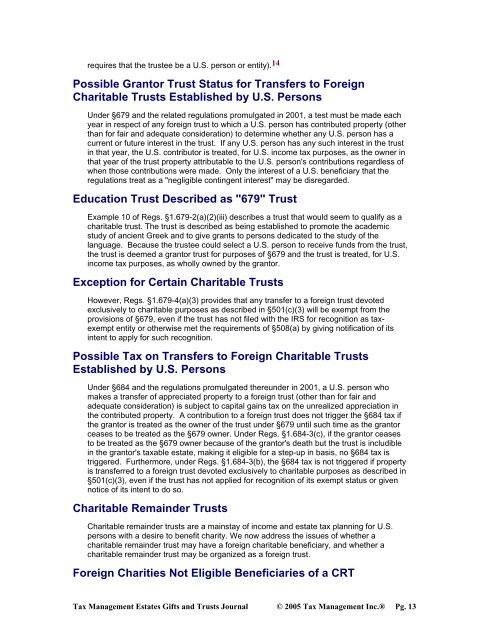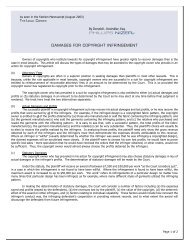International Charitable Giving And Planning ... - Phillips Nizer LLP
International Charitable Giving And Planning ... - Phillips Nizer LLP
International Charitable Giving And Planning ... - Phillips Nizer LLP
You also want an ePaper? Increase the reach of your titles
YUMPU automatically turns print PDFs into web optimized ePapers that Google loves.
equires that the trustee be a U.S. person or entity). 14Possible Grantor Trust Status for Transfers to Foreign<strong>Charitable</strong> Trusts Established by U.S. PersonsUnder §679 and the related regulations promulgated in 2001, a test must be made eachyear in respect of any foreign trust to which a U.S. person has contributed property (otherthan for fair and adequate consideration) to determine whether any U.S. person has acurrent or future interest in the trust. If any U.S. person has any such interest in the trustin that year, the U.S. contributor is treated, for U.S. income tax purposes, as the owner inthat year of the trust property attributable to the U.S. person's contributions regardless ofwhen those contributions were made. Only the interest of a U.S. beneficiary that theregulations treat as a "negligible contingent interest" may be disregarded.Education Trust Described as "679" TrustExample 10 of Regs. §1.679-2(a)(2)(iii) describes a trust that would seem to qualify as acharitable trust. The trust is described as being established to promote the academicstudy of ancient Greek and to give grants to persons dedicated to the study of thelanguage. Because the trustee could select a U.S. person to receive funds from the trust,the trust is deemed a grantor trust for purposes of §679 and the trust is treated, for U.S.income tax purposes, as wholly owned by the grantor.Exception for Certain <strong>Charitable</strong> TrustsHowever, Regs. §1.679-4(a)(3) provides that any transfer to a foreign trust devotedexclusively to charitable purposes as described in §501(c)(3) will be exempt from theprovisions of §679, even if the trust has not filed with the IRS for recognition as taxexemptentity or otherwise met the requirements of §508(a) by giving notification of itsintent to apply for such recognition.Possible Tax on Transfers to Foreign <strong>Charitable</strong> TrustsEstablished by U.S. PersonsUnder §684 and the regulations promulgated thereunder in 2001, a U.S. person whomakes a transfer of appreciated property to a foreign trust (other than for fair andadequate consideration) is subject to capital gains tax on the unrealized appreciation inthe contributed property. A contribution to a foreign trust does not trigger the §684 tax ifthe grantor is treated as the owner of the trust under §679 until such time as the grantorceases to be treated as the §679 owner. Under Regs. §1.684-3(c), if the grantor ceasesto be treated as the §679 owner because of the grantor's death but the trust is includiblein the grantor's taxable estate, making it eligible for a step-up in basis, no §684 tax istriggered. Furthermore, under Regs. §1.684-3(b), the §684 tax is not triggered if propertyis transferred to a foreign trust devoted exclusively to charitable purposes as described in§501(c)(3), even if the trust has not applied for recognition of its exempt status or givennotice of its intent to do so.<strong>Charitable</strong> Remainder Trusts<strong>Charitable</strong> remainder trusts are a mainstay of income and estate tax planning for U.S.persons with a desire to benefit charity. We now address the issues of whether acharitable remainder trust may have a foreign charitable beneficiary, and whether acharitable remainder trust may be organized as a foreign trust.Foreign Charities Not Eligible Beneficiaries of a CRTTax Management Estates Gifts and Trusts Journal © 2005 Tax Management Inc.® Pg. 13




